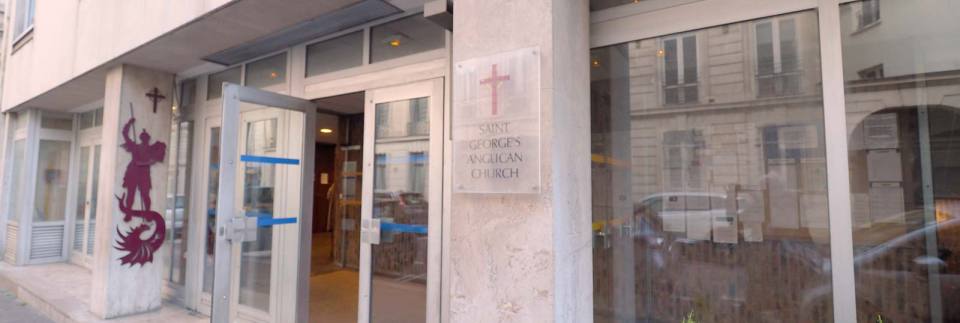Lent, Holy Week and Easter 2016
Diary Sheet for Lent and Holy Week
Document Microsoft Word [48.5 KB]
Looking Forward to Holy Week & Easter
Holy Week and Easter is the centre of the Church’s year at St George’s. Starting on Palm Sunday, March 20th, we keep the whole week as well as we can. Please make an effort to find time to observe this holy season and to attend the ancient liturgies of the Church.
HOLY WEEK & EASTER
20th March to 27th March, 2016
Sunday 20th PALM SUNDAY
8.30 Said Eucharist
10.30 Blessing of Palms, Procession andSolemn Eucharist
Monday 21st March, Tuesday 22nd March & Wednesday 23rd March
Morning Prayer (9.15) & Evening Prayer (18.30)
19.00 Sung Eucharist followed by Address
Thurs. 24th MAUNDY THURSDAY
Morning Prayer (9.15) & Evening Prayer (18.30)
19.30 Sung Eucharist of the Lord’s Supper & Watch
Friday 25th GOOD FRIDAY
Morning Prayer (9.15) & Evening Prayer (18.30)
19.30 Solemn Liturgy of the Passion
Sat. 26th HOLY SATURDAY
Morning Prayer (9.15)
22.00 Vigil & First Mass of Easter with Renewal of
Baptism Vows followed by champagne reception
Sunday 27th EASTER DAY
8.30 Said Eucharist
10.30 Solemn Eucharist
16.00 Messe Malgache
Confessions: Monday 17.30 Fr Matthew
Tuesday 17.30 Fr Andrew
or by appointment
The Holy Week preacher is the Rev’d Paul Baker,
parish priest of St Mark’s, Darlington in the Diocese of Durham.
Fr Paul will be giving an address after the Eucharist Monday, Tuesday & Wednesday of Holy Week and preaching on Maundy Thursday and Good Friday and Easter Day.
HOLY WEEK & EASTER
Holy Week and Easter form the core of the Church’s year. At Saint George’s it is the most important week in our calendar and we have long striven to keep this week as best we can. It is a week that demands our attention and commitment as Christian people. In this week we come very close to the heart and centre of our faith: we commemorate the events surrounding the death and resurrection of Jesus of Nazareth, and because we are members of his body, the Church, we ourselves are caught up in those events.
We are irresistibly drawn to this week because it holds the clue to why we are Christians at all. In it we are urged to reflect deeply on our Christian profession, and as God ushers in a new creation by the death and resurrection of his Son, so we are renewed in our discipleship and brought with Christ from death to new life.
Palm Sunday and the Great Three Days of Maundy Thursday, Good Friday and Holy Saturday are the major days when the whole community assembles. On Monday, Tuesday and Wednesday of the week a simple Sung Eucharist is followed by an address to lead us into these sacred mysteries: a retreat in the city.
The services of Holy Week are unlike anything else in the Church’s year and yet their form and content come from very early in the history of the Church. So as we take part in these liturgies of Holy Week, we are in touch with one of the earliest strands of our common history.
But we are not just aimed at recreating either history or old liturgical routines: God redeems us and calls us into relationship with himself through Jesus, and our presence and participation in these services is tied up with our response to God’s self-giving love. That is why these services are important.
Document Microsoft Word [68.0 KB]
Speakers for the Wednesdays of Lent
18.30 to 19.30 in the Hall, Followed by Refreshments
Instead of reading a Lent Book together, this year we have invited a series of speakers to St George’s from different Christian traditions.
In the spirit of ‘receptive ecumenism’ we will hear what we might learn from other distinctive spiritual approaches and how they are lived by these four contributors.
Wednesday 17th February: Orthodox – en français
Père Ivan Karageorgiev
Père Ivan is a priest of the Bulgarian Orthodox Church. He is co-secretary of the French Council of Churches and Assistant Editor of Unité des Chrétiens. He has a master’s degree from the University of Paris (IV) in philosophy. He will be introducing us to elements of the Orthodox spiritual tradition.
Wednesday 24th February: Evangelical – in English
The Rev’d Nick Clarke
Nick Clarke is a priest of the Church of England and Chaplain of St Peter’s, Chantilly. He will speak about what inspires him from the evangelical strand within the Anglican tradition as well as other influences on his spirituality.
Wednesday 2nd March: Reformed – in English
Pasteure Jane Stranz
Pasteure Jane Stranz is the national secretary for ecumenism at the Fédération Protestante, English in origin with a background in the United Reformed Church, she will be looking at the French Reformed tradition as well as speaking about her own pilgrimage of faith.
Wednesday 9th March: Catholic – en français
M. Emmanuel Lacam
Emmanuel Lacam holds a diploma from the Ecole nationale des chartes, where his thesis concentrated on Jansenism in the eighteenth century Mediterranean world. He is now working on religion during the period of the French Revolution and teaches in the department of modern history at the University of Picardie (Amiens). A parishioner of St Eustache in Paris he will be looking at what inspires him from the French Catholic tradition.
Etude biblique en français pour le Carême
Les Béatitudes
Matthieu 5 : 1-10
Avec Sonia Taylor et Nicolas Razafindratsima
à travers le livre ‘Les Béatitudes’
(Editions Parole et Silence)
de Etienne Goutagny
moine de Notre Dame de Cîteaux
les samedis 13 & 20 février et 5 & 12 mars dans la bibliothèque
15:00
samedi le 19 mars – Chemin de Croix
15.00
St George’s Parish Retreat
Takes place over the weekend of Lent III - Friday 26th to Sunday 28th February - at the Trappist Abbey of Œlenburg in Alsace for those who have already booked places.
Lent: a time for prayer, fasting and almsgiving
Lent is the time when we are called to prepare with joy for the great days of Holy Week and Easter. We do that by a time of reflection and self-examination, and by the traditional three-fold duties of prayer, fasting and almsgiving.
Originally Lent was a time of preparation for candidates who were to be admitted by baptism and confirmation to the Church’s full fellowship at the Easter Vigil. Now the Church recognises that we all need this time in order to prepare to renew the promises we made at our baptism at the Vigil and so I ask you to reflect on how you can mark this holy season of Lent.
Prayer
Prayer is central to the life of any believer: it is the life blood of our relationship with God, who loves us and has come to us in the life and death of Jesus Christ. Lent should be a season when we make sure we are giving time and focus to our prayer life both in the quiet of our homes and in the public worship of the Church. Lent is a time to reflect on the sources of prayerfulness that can sustain us and refresh us.
Fasting
Of course we are all familiar with the concept of ‘giving something up for Lent’ and that can be a good discipline for each one of us. Fasting in the Bible has other connotations though. It is also a sign of our stewardship of God’s creation: that we are not just in this life out to satisfy our own desires. The prophets of the Old Testament also talked about fasting as a concern for justice in the world. Fasting then is a call to reflect on how we live our lives in harmony with our care for the world and our neighbour.
Almsgiving
Almsgiving may now sound a rather old-fashioned word: at its heart is the duty we have as Christians to lead lives that give something to the society in which we live. As we reflect on our blessings and on the goodness of creation and on the story of God’s love for us in Jesus Christ, we remember his message that what we do for our brothers and sisters in need we do also for him. Lent is a time to reflect on how we can live generous and open lives.
Lent IV is Mothering Sunday: March 6th.
Although it falls in the school holidays the 10.30 service will include the blessing of flowers.
Weekday Eucharists in Lent
The Eucharist is celebrated on Tuesdays and Thursdays at 18.30 and on Wednesdays and Saturdays at 12 noon in the chapel. These short services are quiet and meditative: they can add a different rhythm to your life of prayer.


